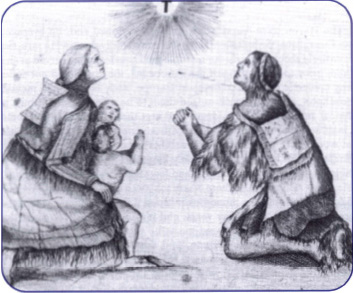
Most of the merchant companies and fur trade workers disapproved of the faith-driven missionaries like the Jesuits, Marguerite Bourgeoys and Jeanne Mance. They worried that educated Natives would demand more in return for the furs they trapped, or worse yet, stop trapping altogether. The liquor the French gave them kept the Natives dependent, and the traders made sure they were given lots of “firewater”.
Fighting between the French, their Native allies and the Iroquois intensified and ultimately, the Governor of Quebec, Pierre Dubois d’Avaugour, (called “Ontonio” or “big mountain” by the Natives, a name they gave to important French governors), imposed severe penalties on those who trafficked in liquor. Punishment included whipping, imprisonment and even death. Unfortunately, most colonists were guilty of the crime. When one priest pleaded on behalf of an imprisoned woman, d’Avaugour was furious. He decreed that if liquor trafficking wasn’t a crime for her, then it wasn’t for anyone in the colony.
Frustrated, Bishop Laval tried to impose excommunication on liquor smugglers. Nevertheless, firewater flowed freely. It seemed that nothing could stop it.

This drawing by a Jesuit missionary in 1657 shows a Wendat family praying after their conversion to Christianity.
“Had it not been for the vileness of the Companies’ agents, and the treachery of the paid servants of the traders, perhaps Fathers Lalement and de Brébeuf would never have been martyred by the irritated Iroquois.”
-Marie de l’Incarnation
Excommunication is a punishment whereby a person is banned from the Roman Catholic Church for their sins.